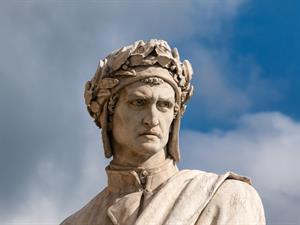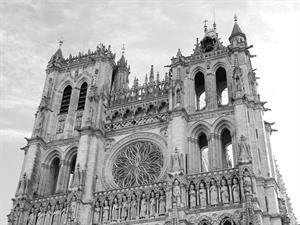PDF chapter test TRY NOW
The Results of the Renaissance:
The Renaissance period left its valuable imprints in all aspects of the lives of people. The advent of the concept of Humanism and its ideals changed the dynamics of a society substantially.
The birth of Renaissance literature in the lands of Italy played a pivotal role in shaping the thoughts and beliefs of the People. Notable scholars like Dante, Petrarch, and Thomas Moore kindled the thoughts of people with their writings.
Dante: He was one of the notable philosophers of the Renaissance period whose book named “Divine Comedy” spoke about hell, heaven and the Other worlds.

Dante
The writings of these scholars in Vernacular languages promoted the language as well as their thoughts to the root of the society.
2. Art:
The Departure of the artistic tradition from Medieval Europe to the Renaissance period witnessed humongous changes in the concepts of arts. During the Earlier period, art was mostly associated with religion and the Church.
The renewed spirits of the Renaissance artisans created paintings that were secular and concentrated on realistic concepts.
3. Architecture:
The realm of Architecture saw the emergence of new construction styles of the Churches and the Cathedrals. The Medieval Churches contained pointed arches, which were later replaced by the domes, Round arches and the Plain lines during the Renaissance Period.
The height of Renaissance architecture was seen in Florence's Italian city, which was considered the “Nerve centre of the Italian Renaissance art”.
4. Sculpture:
The Sculptures of the Renaissance were more inclined towards the concept of realism as more attention was given to the intricate details of the shape, size, and aspects of the figures of humans, which were one of the unique features of the Renaissance period.
Lorenzo Ghiberti: He was the famous sculptor of Italy credited for the Bronze doors carved in the entrance door of the Church in Florence.
5. Science:
The age of Renaissance saw the greatest leap in the field of science where numerous subjects like astronomy, physics, and medicine changed the pre-existing thoughts of society.
William Harvey: He was a notable scientist of the Renaissance period who discovered the “Circulation of blood in the human body” which was considered as one of the greatest discoveries of that period.
Contributions of notable scientists like Galileo, Kepler and Copernicus changed the perspective of the European society in the field of science. Subjects like Human anatomy was given substantial importance during the Renaissance period.
The Reformation:
The Roman Church was also part of the Feudal structure, which had a certain degree of independence from the King. It was one of the Universal institutions to function during the Middle Ages of Europe.

Roman Church
The church was bestowed with both the Temporal and the Spiritual powers which were headed by the “Pope” who was the supreme authority to decide the matters of the church. The papacy was the office of the Pope.
Under Pope, there were other heads to advise the authority about the course of the church, they are:
Bishop: Headed the institutions at the district level.
Abbott: Chief Priest among the Christians who was next under the Pope.
Clergy: A group of people who perform pastoral and Sacramental functions in the Church. The Priesthood increased the power of the Clergy people.
The Church preached the ideals of Sins and Penance to keep the people under their clutches; they also further taught them if they were ready to accept their mistakes and undertake penance, they would go to heaven or else they will burn in hell.
Spanish Inquisition: The Inquisition was a dominant office that functioned under the Catholic church to root out the heresy beliefs against the church. The most infamous among them was the Spanish Inquisition which lasted for \(200\) years.
Punishments given by the Churches for unruly behaviour and treason were of the highest order like “Excommunication” which means the stripping of all the rights of a Christian.
